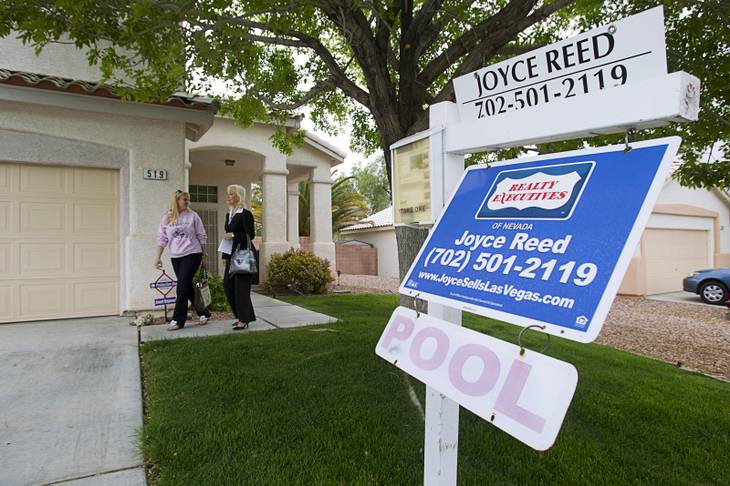VEGAS INC coverage
Imagine this: An investor buys your home as a short sale and instead of forcing you out, allows you to stay in the house as a renter with the option to buy the place back.
In many cases, such a deal could land you in jail.
Now, it is forming the basis of a business model in the Las Vegas Valley.
Real estate broker Dave Dziedzic, founder of RealCore Realty in Arizona, opened an office in Las Vegas this year to launch Housing Angels, which connects investors with underwater homeowners. The investors buy homes through short sales, then lease them back to the former owners with an option to buy.
If the deals go smoothly, upside down Las Vegans avoid foreclosure and stay in their homes while Dziedzic’s investors make a nice profit.
Investors typically sign four-year leases with the former homeowners. If they end up buying the house back within two years of the short sale, they pay 20 percent more than the investor paid for the house. The price jumps an additional 10 percent if the tenants wait until the third or fourth year to buy.
If they don’t buy at all, they lose a deposit but still might be able to stay in the house as tenants, as long as the investor approves. Homeowners typically put down a nonrefundable $3,000 deposit to get the buy-back option from Housing Angels.
Depending on whom he represents as a broker, Dziedzic can earn commissions from both the banks and his investors, who live in California, Alaska, Canada and elsewhere.
The investors are a diverse group. Some are business owners, others are corporate executives. Most have prior experience in real estate. Dziedzic finds the investors through advertising, seminars and his website.
Dziedzic, who grew up near Toronto and had a short-lived minor league hockey career in the 1980s, formed Housing Angels in 2010 in Arizona with his wife, Heather Cook, also a real estate broker. The couple have closed more than 1,000 deals so far in Arizona and expanded their company to Las Vegas a few months ago. The group operates locally as Gold Door Realty.
They are working with about 10 clients in the Las Vegas Valley but haven’t closed any deals yet. They still need bank approval for the short sales.
The region is ripe for Housing Angels' services. Fifty-four percent of homeowners with mortgages were underwater as of spring, meaning their debt outweighed their home’s value. That's more than double the national rate and is the highest in the country, according to Zillow.
“We have saved people from foreclosure,” Dziedzic said.
But there’s a big sticking point: There’s no guarantee that banks will allow such an arrangement.
In a short sale, a lender agrees to sell a house for less than what’s owed on the mortgage. Mountains of paperwork are needed to close the deal, including in most cases an arm’s length agreement. That's a document signed by both the seller and buyer that certifies the sale is between people who didn’t know each other before the deal came about. It promises that the parties have no agreements to let the sellers stay as renters or buy back the house.
Banks aren't legally required to get that signed promise, but they often do. If a buyer or seller lies about their relationship, it’s fraud.
In June, a federal grand jury indicted a Henderson couple accused of short selling their house to a relative whom they enlisted as a straw buyer. Cynthia Hosbrook, a licensed real estate agent, and Robert Hosbrook, a former licensed real estate agent, were charged with bank fraud and conspiracy to commit bank fraud. The Hosbrooks planned to stay in the home and lied on the arm’s length agreement they submitted to Wells Fargo Bank, according to the indictment.
If convicted, the Hosbrooks face up to 30 years in prison and $1 million in fines on each count.
Dziedzic said his group tells banks upfront about the Housing Angels setup. Many require arm’s length agreements, but others are willing to waive the requirement. Dziedzic said it’s easier to negotiate with smaller banks than heavyweights, such as Wells Fargo and Bank of America.
If a bank won't budge on the issue, Dziedzic's investors still would buy the property and rent a different house to the homeowner.
The rules are set to change later this year, however. It could prove a boon to Dziedzic’s business.
State Senate Bill 321, known as the Homeowner’s Bill of Rights, takes effect Oct. 1 and essentially prohibits banks from forcing homeowners to sign arm’s length agreements as part of short sales.
When the change takes effect, it likely will allow Housing Angels investors to buy distressed homes and earn rental income right away from former owners.
Dziedzic had planned to open a Las Vegas office before he knew about the bill, which Gov. Brian Sandoval signed June 3. But when he heard about it, “I just about jumped out of my shoes,” he said.
Bill Uffelman, president and CEO of the Nevada Bankers Association, said he has never asked lenders about their willingness to forgo arm’s length agreements. But he predicted Dziedzic won’t be the only broker or investor capitalizing on the new rules by renting or selling distressed homes to their former owners.
“There will be more people like that. There’s no question in my mind,” he said.

